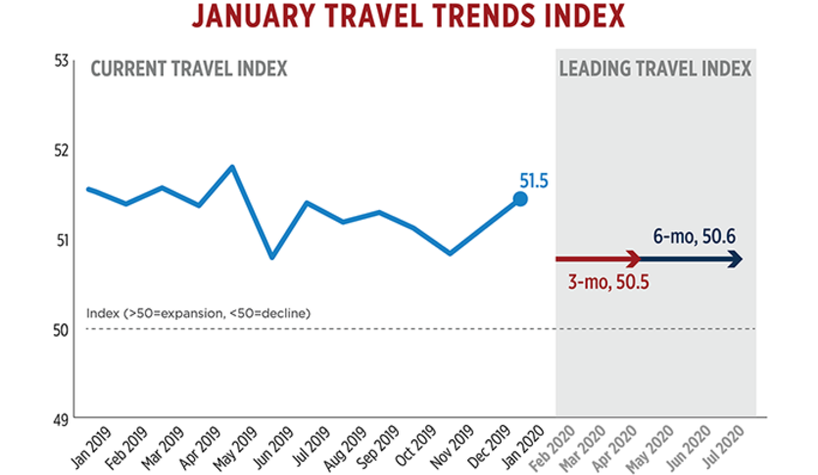WASHINGTON—The Leading Travel Index (LTI), the predictive component of the U.S. Travel Association’s Travel Trends Index (TTI), projects international inbound travel to the U.S. will fall 6% over the next three months as the coronavirus outbreak continues to affect the global economy.
The latest TTI captured data from January, when awareness of coronavirus began to rise and China—one of the biggest travel markets to the U.S.—implemented aggressive measures to curb travel out of certain cities.
The predicted 6% three-month decline compared to the same period in 2019 is the sharpest in the five-year history of the TTI, and would be the largest drop in international inbound travel since the 2007-2008 financial crisis.

U.S. Travel economists caution that the detectable impact from coronavirus is almost certain to escalate once data becomes available for February, when the U.S. restricted inbound travel from China and concern began to take hold around the world.
“There is a lot of uncertainty around coronavirus, and it is pretty clear that it is having an effect on travel demand—not just from China, and not just internationally, but for domestic business and leisure travel as well,” said Roger Dow, president/CEO, U.S. Travel Association.
“A big part of the coronavirus narrative is about whether it’s safe to travel,” Dow continued, “but it’s important to keep in mind that the restrictions and warnings are highly specific to countries where there have been pronounced outbreaks. Right now, there is absolutely no official guidance that people need to reconsider travel in the U.S.”
The impact of coronavirus was not apparent in the backward-looking Current Travel Index (CTI), with international inbound travel growth flat at 0.2%. A strong January for domestic leisure travel (4.2% growth year-over-year) fueled a positive showing for the U.S. travel industry as a whole, with the overall CTI (51.5) indicating 3% growth overall for the month.
That is almost certain to change as future TTIs begin to reflect the cascading effects of the coronavirus public health scare.
That is crucial headed into the spring—always a busy time for both business and leisure travel in the U.S. But Dow pointed to advice from agencies such as the Centers for Disease Control and Prevention that the best thing travelers can do is utilize good health practices—wash hands often, cover your cough or sneeze, stay home if you are sick, etc.
“Obviously the traveling public should be exercising caution just as they would for the average flu season,” said Dow. “But for the many of us who have upcoming plans to attend a convention or meeting or go on a family vacation, public health officials have repeatedly said there is no cause to alter those U.S.-based plans at the moment.”
